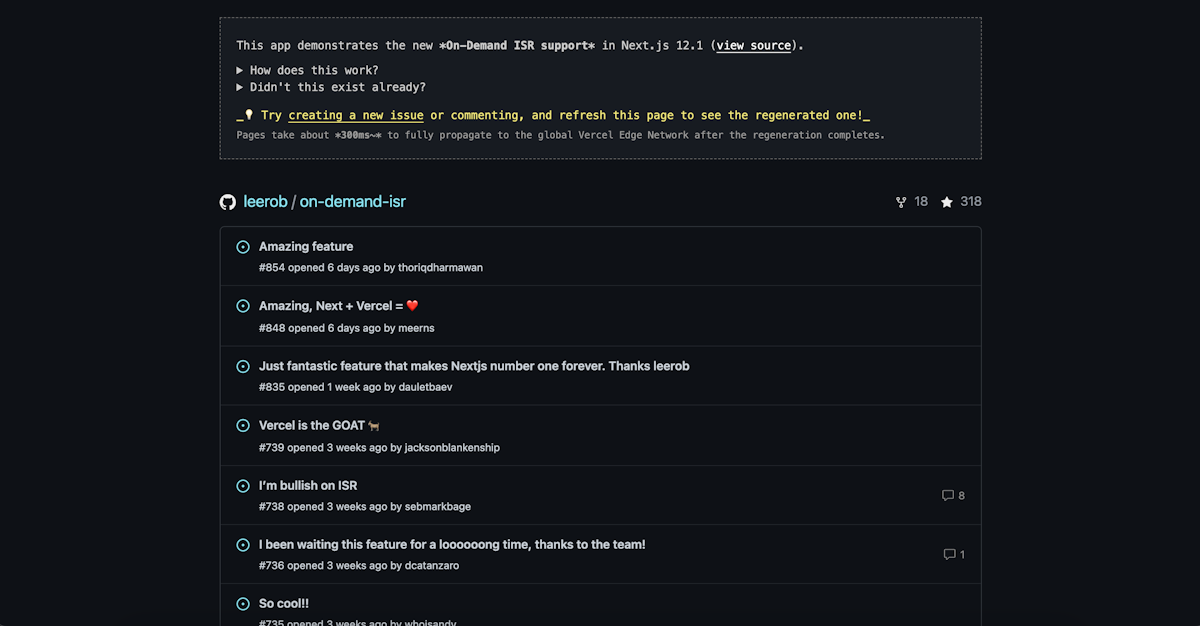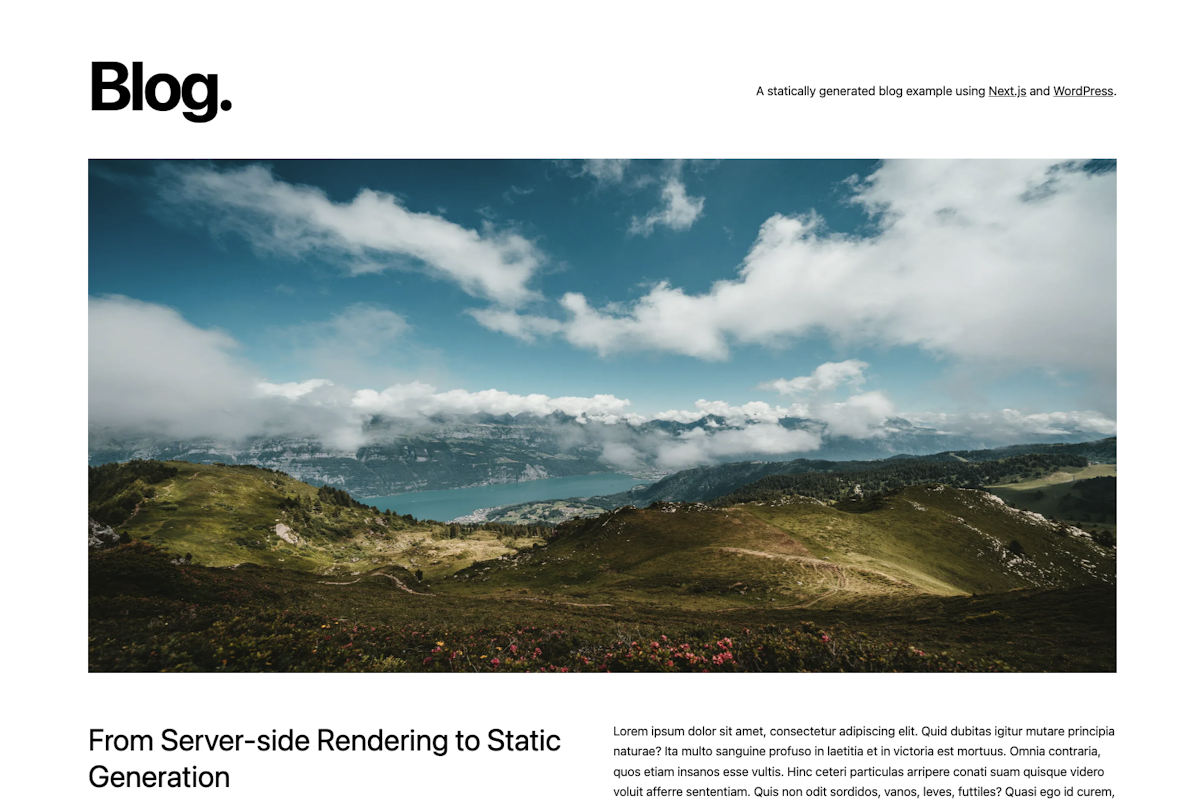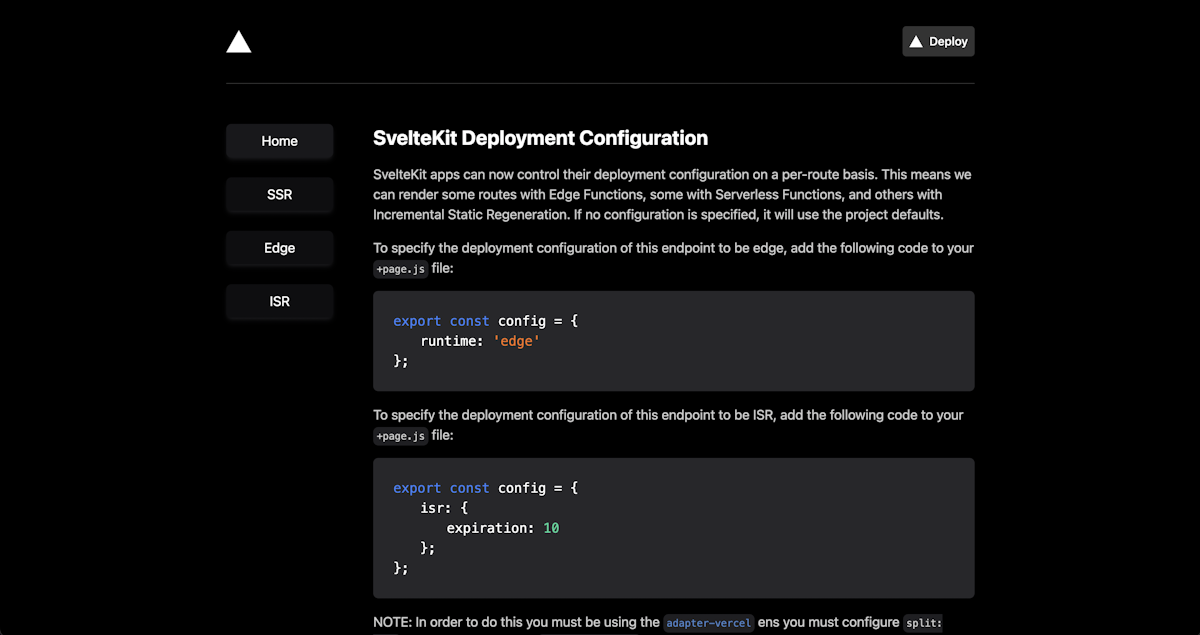Incremental Static Regeneration (ISR)
Learn how Vercel's Incremental Static Regeneration (ISR) provides better performance and faster builds.Incremental Static Regeneration (ISR) allows you to create or update content on your site without redeploying. ISR's main benefits for developers include:
- Better Performance: Static pages can be consistently fast because ISR allows Vercel to cache generated pages in every region on our global Edge Network and persist files into durable storage
- Reduced Backend Load: ISR helps reduce backend load by using cached content to make fewer requests to your data sources
- Faster Builds: Pages can be generated when requested by a visitor or through an API instead of during the build, speeding up build times as your application grows
ISR is available to applications built with:
- Next.js
- SvelteKit
- Nuxt
- Astro
- Gatsby
- Or any custom framework solution that implements the Build Output API

On-Demand ISR
Instantly update content without redeploying.

ISR Blog with Next.js and WordPress
An Incremental Static Regeneration Blog Example Using Next.js and WordPress

SvelteKit Route Config
This template shows how to configure Edge Functions, Serverless Functions, and ISR in SvelteKit applications on a per-route basis.
Next.js will automatically create a Serverless Vercel Function that can revalidate when you add next: { revalidate: 10 } to the options object passed to a fetch request.
The following example demonstrates a Next.js page that uses ISR to render a list of blog posts:
interface Post {
title: string;
id: number;
}
export default async function Page() {
const res = await fetch('https://api.vercel.app/blog', {
next: { revalidate: 10 },
});
const posts = (await res.json()) as Post[];
return (
<ul>
{posts.map((post: Post) => {
return <li key={post.id}>{post.title}</li>;
})}
</ul>
);
}To learn more about using ISR with Next.js in the App router, such as enabling on-demand revalidation, see the official Next.js documentation.
- See our dedicated SvelteKit docs to learn how to use ISR with your SvelteKit projects on Vercel
- See our dedicated Nuxt docs to use ISR with Nuxt
When using the Build Output API, the Serverless Vercel Functions generated for your ISR routes are called Prerender Functions.
Build Output API Prerender Functions are Serverless Functions with accompanying JSON files that describe the Function's cache invalidation rules. See our Prerender configuration file docs to learn more.
Both ISR and Cache-Control headers help reduce backend load by using cached content to make fewer requests to your data source. However, there are key architectural differences between the two.
- Shared Global Cache: ISR has cache shielding built-in automatically, which helps improve the cache
HITratio. The cache for your ISR route's Vercel Function output is distributed globally. In the case of a cacheMISS, it looks up the value in a single, global bucket. With onlycache-controlheaders, caches expire (by design) and are not shared across regions - 300ms Global Purges: When revalidating (either on-demand or in the background), your ISR route's Vercel Function is re-run, and the cache is brought up to date with the newest content within 300ms in all regions globally
- Instant Rollbacks: ISR allows you to roll back instantly and not lose your previously generated pages by persisting them between deployments
- Simplified Caching Experience: ISR abstracts common issues with HTTP-based caching implementations, adds additional features for availability and global performance, and provides a better developer experience for implementation
See our Cache control options docs to learn more about Cache-Control headers.
On-demand revalidation is scoped to the domain and deployment where it occurs, and doesn't affect sub domains or other deployments.
For example, if you trigger on-demand revalidation for example-domain.com/example-page, it won't revalidate the same page served by sub domains on the same deployment, such as sub.example-domain.com/example-page.
See Revalidating across domains to learn how to get around this limitation.
When using ISR with a framework on Vercel, a Function is created based on your framework code. This means that using ISR incurs both Function usage as well as bandwidth:
- Incur usage when invoked – ISR functions are invoked whenever they revalidate in the background or through on-demand revalidation
- Add to your bandwidth usage
Explore your usage top paths to better understand ISR usage and pricing.
Was this helpful?